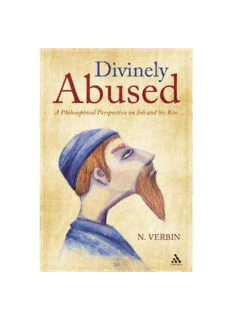
Divinely Abused: A Philosophical Perspective on Job and His Kin PDF
Preview Divinely Abused: A Philosophical Perspective on Job and His Kin
Divinely Abused This page intentionally left blank Divinely Abused A Philosophical Perspective on Job and His Kin N. Verbin Continuum International Publishing Group The Tower Building 80 Maiden Lane 11 York Road Suite 704, New York London SE1 7NX NY 10038 www.continuumbooks.com All rights reserved. No part of this book may be reproduced, stored in a retrieval system, or transmitted, in any form or by any means, electronic, mechanical, photocopying, recording, or otherwise, without the permission of the publishers. Copyright © 2010 by Nehama Verbin Library of Congress Cataloging-in-Publication Data A catalog record for this book is available from the Library of Congress. ISBN: 978-0-8264-3588-0 (hardcover) Typeset by Newgen Imaging Systems Pvt Ltd, Chennai, India Printed in the United States of America Cover image: Ruth Adler In memory of D. Z. Phillips a teacher, a friend This page intentionally left blank Contents Acknowledgments ix Introduction xii 1. What is Abuse? 1 1. Self-Worth 3 1.1 Self-worth and justifi cation 3 1.2 Resentment and self-worth 6 2. Happiness 7 2.1 The Socratic conception 8 2.2 The Maimonidean conception 9 2.3 The Wittgensteinian conception 10 3. Power 11 3.1 The intuitive paradigm 12 3.2 The moral paradigm 13 3.3 The self-restraint paradigm 15 2. Divine Abuse 22 1. Job’s Conception of Happiness 23 1.1 The worldly conception 23 1.2 The moral conception 26 2. Job’s Conception of Self-Worth 28 2.1 Humiliation and elevation 29 2.2 Resentment and moral hatred of God 31 3. Power and Power Relations 34 3.1 Job’s conception of power 34 3.2 Job’s manner of exercising his power 39 3. The Way Out: From Abuse to Suffering 47 1. Affl ictions of Love and Love of Affl ictions 47 1.1 Affl ictions of love 47 1.2 Love of affl ictions 51 2. Providence and Intervention 58 2.1 Providence as intervention 58 2.2 Maimonides 60 2.3 Simone Weil 67 viii Contents 3. Providence Lost 71 3.1 Affl ictions of hate 71 3.2 Malevolent providence 72 3.3 From abuse to suffering 74 4. Forgiveness 84 1. The Victim 85 1.1 Harms, wrongs, and hostile emotions 85 1.2 Resentment and reason 88 1.3 Overcoming resentment 96 2 The Assailant 99 2.1 Telling the moral story 99 2.2 Telling the biographical story 101 2.3 Telling the same story 103 3. Forgiveness 106 3.1 Forgiveness without reconciliation 106 3.2 Reconciliation without forgiveness 108 3.3 Forgiveness and reconciliation 110 5. Forgiving God 116 1. Protest 116 1.1 Roth’s theodicy of protest 117 1.2 Blumenthal’s ‘theology of protest’ 118 2. Beyond Protest 121 2.1 Protest in context 121 2.2 Beyond protest 127 3. Forgiving God 130 3.1 The logical space for forgiveness 131 3.2 Forgiving God 139 3.3 Subsisting in brokenness 141 Conclusion 147 Bibliography 151 Index 157 Acknowledgments Many have contributed to the coming to being of Divinely Abused. I would like to start by apologizing to all those that have helped me in the process and that I fail, at this moment, to remember and acknowledge in print. Your names and contributions would probably come to my mind when the book is in print. I am deeply sorry for failing to do you justice. My life is divided between Tel Aviv and Jerusalem. I hold an academic post at Tel Aviv University and a fellowship at the Shalom Hartman Institute in Jerusalem. Both places have welcomed me and my passion for philosophy of religion in a manner that makes me feel at home in them. I would like to start by thanking Shlomo Biderman for the interest that he had taken in my work, for his encouragement and support, for kind words and kind deeds. Without him, I might have been still looking for an academic post in Israel. I am also grateful to Zvi Tauber and Yaron Senderowich for my fi nding a home at Tel Aviv University. Menachem Fisch’s encouragement, the door to his offi ce that has always been open for me, his faith in me and, above all, his friendship have been enormously important to me and they remain so. I am also grateful for various conversations during which he had shared with me his work on the confrontative Talmudic approach to God. They have signifi cantly enriched my understanding and appreciation of the Talmud. My conversations with Menachem Lorberbaum about Maimonides and Wittgenstein about poetry and life have penetrated the book and remain very much alive in my head. I am grateful for the conversations and the friendship. Galia Patt Shamir and Tamar Aylat-Yaguri have made the corridors of Tel Aviv University sunny and shiny, and religion and religiosity even more exciting than they ordinarily are for me. I am grateful for numerous personal and philosophical conversations with both. I am also grateful to Miri Rozmarin, with whom it was and is a pleasure to share a room and discuss feminism, motherhood and the relevance of a transcendence beyond. Special thanks are also due to Anat Biletzki for her support of my academic passion, for her genuine interest and care. David Hartman and Donniel Hartman, who have welcomed me into the Shalom Hartman Institute, where God is very much alive and kicking, have had a tremendous infl uence on my life and thinking. It is here that I have discovered the bold world of Talmudic thought and the challenging world of Jewish thinking.
Description: